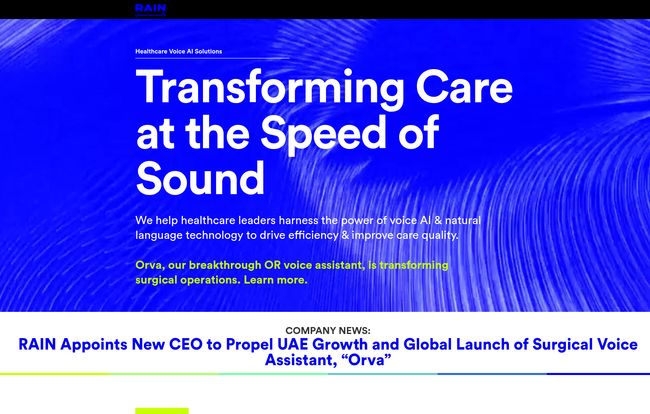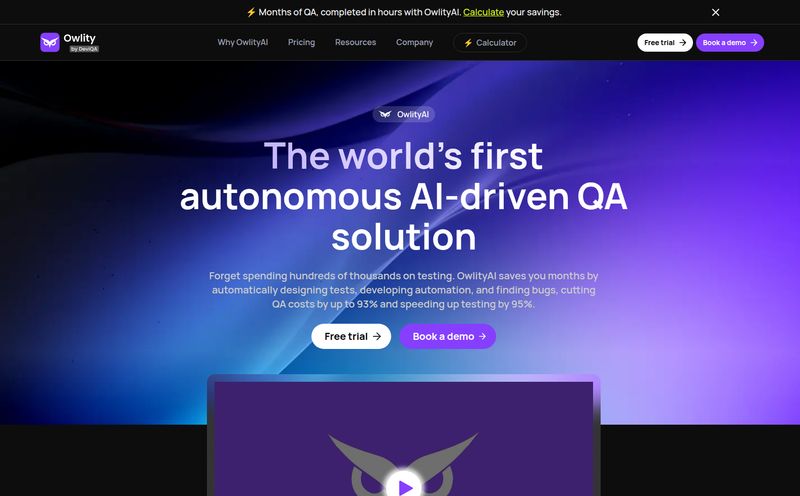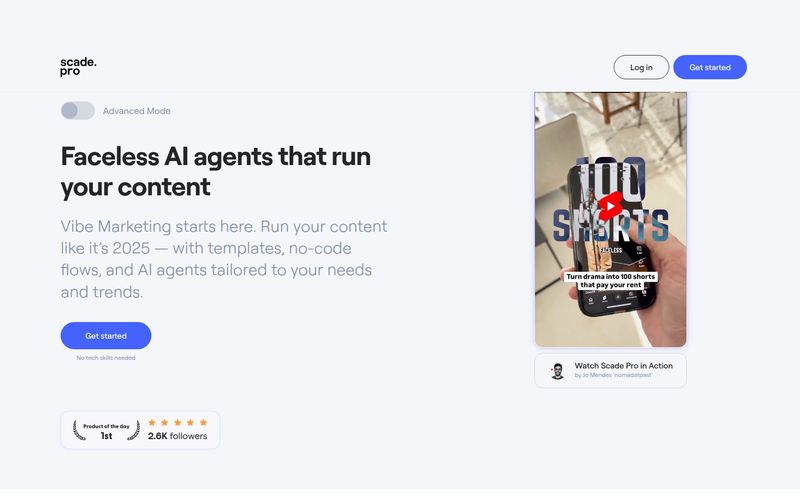I’ve spent years neck-deep in the world of SEO, traffic, and trends. I’ve seen fads come and go faster than you can say “algorithm update.” But every once in a while, a technology comes along that feels… different. It’s not just a flash in the pan. It feels like a foundational shift. And lately, all my signals are pointing towards voice and conversational AI, especially in places you wouldn’t expect.
Forget asking Alexa for the weather. I’m talking about high-stakes, high-pressure environments where every second counts. I’m talking about healthcare. And that’s where I stumbled upon a company named RAIN. Their tagline? “Transforming Care at the Speed of Sound.” Bold. I like bold. But as we all know, a great tagline doesn’t always mean a great product. So, I decided to take a closer look.
What Exactly is RAIN? More Than Just Weather Puns
Let's get this out of the way. RAIN is a company specializing in voice and conversational AI solutions. They're not a startup tinkering in a garage; they have offices in the US (Connecticut) and the UAE (Abu Dhabi), which tells me they have a global ambition. Their laser focus is on enterprise clients, particularly within the healthcare sector. Their mission isn't just about cool tech; it's about solving three of the biggest headaches in any large organization: efficiency, safety, and employee satisfaction.
They’re building custom voice assistants that allow people to do their jobs without being tethered to a keyboard or constantly tapping on a screen. Think of it as giving a superpower to the workforce. A voice. A very, very smart voice.
The Promise of a Voice-Enabled Workforce (And Why It Really Matters)
RAIN’s website lays out four big promises for a voice-first workplace. It’s easy to dismiss these as marketing fluff, but when you apply them to a setting like a hospital, they suddenly get very real.
First, there's Efficiency. The claim is that voice is faster and more accurate than typing. In an office setting, that saves a few minutes. In a surgical setting? It’s a game-changer. I saw a stat they cited from SnapLogic that an incredible 90% of employee time on repetitive tasks could be automated. Imagine a nurse being able to log patient vitals just by speaking, instead of taking off gloves, finding a terminal, logging in, and typing everything out. That’s not just a time-saver; it's a focus-saver.
Then comes Safety. This one is huge. Hands-free interaction means doctors and nurses can keep their eyes on the patient, not on a tablet. In a sterile environment like an operating room, it also means less contact with screens and keyboards, reducing the risk of contamination. It's such a simple concept, but the implications for patient safety are massive.
Finally, there's Flexibility and Satisfaction. Every voice experience they build is custom. This isn't a one-size-fits-all solution. They work with the organization to remove what they call “process friction.” I love that term. It’s the digital equivalent of trying to run in mud. It's all the little, annoying, time-consuming steps that technology forces on us. Removing that friction doesn’t just make things faster; it makes employees happier. Given the rates of burnout in healthcare, anything that makes a clinician’s day even a little bit easier is a monumental win.
Meet Orva: The Voice Assistant for the Operating Room
This is where it gets really interesting. RAIN isn't just talking theory; they have a flagship product called Orva. This is their voice assistant built specifically for the chaos and precision of the operating room. They recently unveiled it at the Arab Health Global Healthcare Week, which shows they are serious about this market.
Just take a second to picture the use cases. A surgeon, mid-procedure, needing to review a patient's scans. Instead of asking a nurse to pull it up, potentially distracting them from another critical task, they could just say, “Orva, show me the latest CT scan on the main display.” Or, “Orva, what was the patient’s blood pressure five minutes ago?” or “Orva, log the time of aortic clamping.”

Visit RAIN
This is about creating a truly connected, responsive environment where technology serves the surgical team, not teh other way around. It’s like giving the entire room a central nervous system that responds to natural language. The potential to streamline documentation, improve coordination, and reduce cognitive load on the surgical team is just immense.
The Data Doesn't Lie: Why Execs are Listening to Voice AI
This isn't just a niche fascination for tech bloggers like me. The C-suite is paying attention. RAIN’s site quotes a study from Opus research stating that 73% of executives see real value in voice for improving operational efficiency. That’s a clear signal that this is moving from the ‘innovation lab’ to the boardroom budget meeting.
They also cite a Gartner prediction that 25% of employee interactions with applications would be through voice by 2023. Now, we're past 2023, and while I don’t think we’ve hit that number across the board, the trend is undeniable. The adoption might be slower than the hype, as it always is, but the direction of travel is clear. The pandemic probably accelerated this, highlighting the need for more touchless interactions in every industry.
But Is It All Sunshine and... RAIN? A Realistic Look
Okay, I’m excited. But my job is also to be a skeptic. No technology is perfect, especially not in its early stages. So, what are the potential pitfalls?
Where's the Price Tag?
First off, the cost. You won't find a pricing page on RAIN's website. This is typical for high-end, enterprise B2B solutions. You can’t just buy it off the shelf. The pricing is almost certainly custom, based on the scale of the deployment, the complexity of the integration, and the level of customization required. For a hospital system, this is going to be a significant investment, and the ROI calculation will have to be rock solid.
The Integration Challenge
A tool like Orva can't live on an island. It has to talk to the hospital's existing systems—the Electronic Medical Record (EMR), imaging archives (PACS), and other clinical software. Anyone who has worked in health tech knows that this is the hard part. These legacy systems can be notoriously difficult to work with. A successful RAIN deployment will depend heavily on a smooth integration process.
The Accuracy Question
Finally, and most importantly, it all comes down to accuracy. If I ask my smart speaker to play the wrong song, it's a minor annoyance. If a voice assistant in an OR misunderstands a command or pulls up the wrong patient's data... well, that’s a nightmare scenario. The natural language processing and voice recognition have to be near-flawless, able to understand different accents, and filter out background noise. This is the ultimate test, and the one area where there is absolutely no room for error.
My Final Verdict on RAIN's Voice AI
So, after digging in, what’s my take? I'm genuinely optimistic. RAIN is tackling a real, painful problem in an industry that desperately needs innovation in its user interfaces. The friction of interacting with digital systems in healthcare is a known contributor to burnout and inefficiency.
Voice is such a natural, human way to interact with technology, and bringing it into the sterile, hands-busy environment of a hospital or operating room just makes perfect sense. RAIN seems to have the focus, the technology, and the strategic vision to be a major player in this space. It’s not a magic wand, and the challenges of integration and accuracy are real. But it represents a future where technology adapts to people, not the other way around. And that's a future worth getting excited about.
Frequently Asked Questions about RAIN and Orva
- 1. What is RAIN?
- RAIN is a technology company that specializes in creating voice and conversational AI solutions. They focus primarily on the healthcare industry, building tools to help improve safety, make operations more efficient, and reduce friction for employees like doctors and nurses.
- 2. What is Orva?
- Orva is RAIN’s flagship product. It's a specialized voice assistant designed to be used in surgical operating rooms. It allows the surgical team to use voice commands to control displays, access patient data, log information, and coordinate tasks without having to touch a screen or keyboard.
- 3. Who is RAIN's voice technology for?
- While the technology could be applied to many industries, RAIN's primary focus is on enterprise-level healthcare organizations, such as hospitals and surgical centers. Their solution is designed for high-stakes environments where hands-free interaction is a major benefit.
- 4. How much does a system like Orva cost?
- RAIN does not publish its pricing publicly. This is common for custom enterprise software. The cost would likely be determined on a case-by-case basis, depending on the size of the hospital, the number of operating rooms, and the complexity of integrating Orva with the hospital's existing software systems.
- 5. Is voice AI safe to use in a hospital?
- This is a critical concern. The safety of a system like Orva depends entirely on its accuracy and reliability. The voice recognition must be nearly perfect and the system must have robust safeguards. Companies like RAIN invest heavily in making their AI extremely accurate and secure for precisely this reason, as it's essential for use in a clinical setting.
- 6. What are the main benefits of using a voice assistant in the OR?
- The primary benefits are improved efficiency (faster documentation and data retrieval), enhanced safety (hands-free, sterile interaction and allowing staff to keep focus on the patient), and better staff satisfaction (reducing the frustration of clumsy interfaces and repetitive tasks).
Conclusion
The operating room of the future might be a lot quieter in some ways, but more conversational in others. The constant beeping and tapping on screens could be replaced by a calm, clear dialogue between the surgical team and their AI assistant. Companies like RAIN are not just selling software; they're pushing a new philosophy for how humans and machines should work together in the most critical of moments. Their goal of “Transforming Care at the Speed of Sound” isn’t just a clever phrase—it might just be the next benchmark for modern medicine.
Reference and Sources
- RAIN Official Website: https://rain.agency/ (Note: The provided URL led to their main agency page, information was gathered from the attached images which seem to be from a specific product or initiative page)
- Opus Research: https://opusresearch.net/
- Gartner: https://www.gartner.com/en
- SnapLogic: https://www.snaplogic.com/



